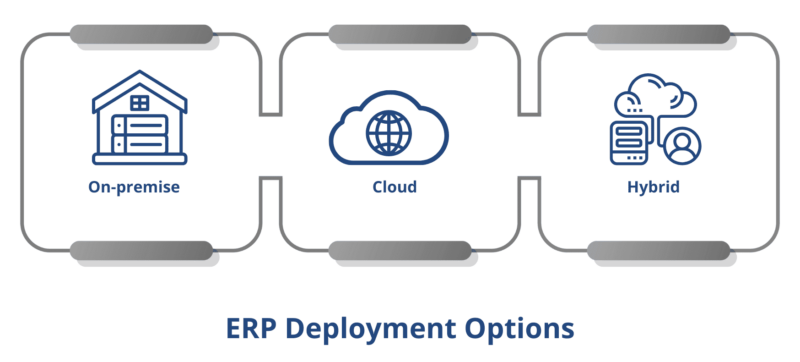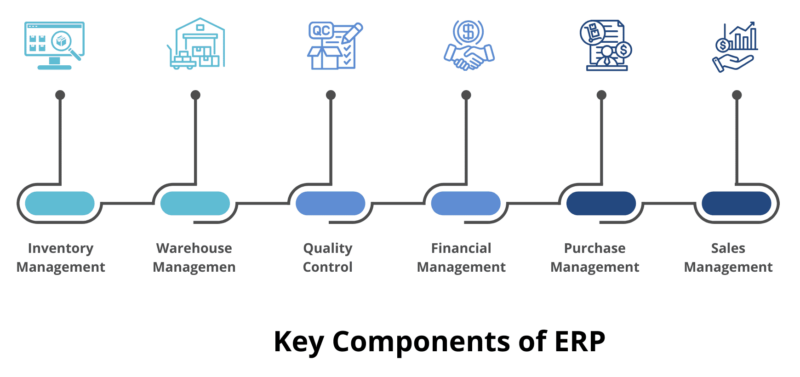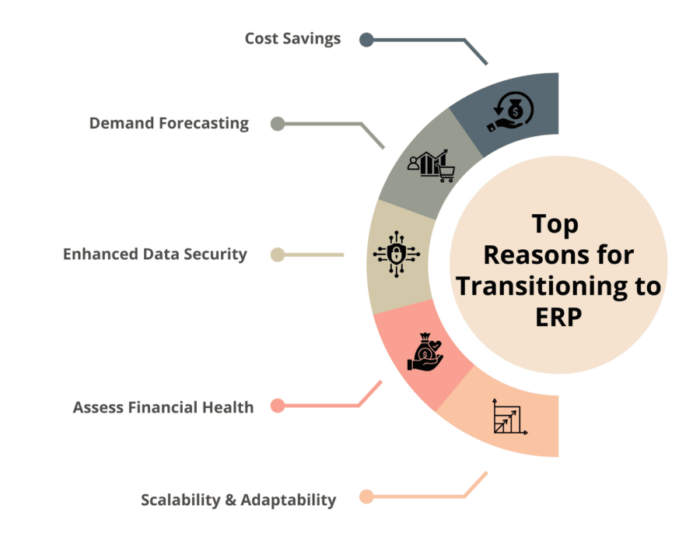ERP Stand For
Revolutionize your business operations, achieve operational excellence, and streamline success with Enterprise Resource Planning (ERP)
What Does ERP Stand For?
ERP stand for Enterprise Resource Planning, which is a strategic tool that provides companies with unrivaled visibility into their operations and eliminates the need to juggle between different spreadsheets & legacy applications.
ERP Software is a complete business management solution that streamlines core business operations spinning from raw material purchase to financial management. It breaks down data silos, standardizes processes across all departments, and addresses various operational pain points.
What are the Different ERP Deployment Options?
1. On-premise Deployment
On-premise ERP is the traditional deployment option that’s mostly preferred by large companies that can invest a significant capital base on software frees, hardware upgradation, and a dedicated IT workforce. On-premise offers significant customization abilities to configure it for your specific business needs.
2. Cloud Deployment
Cloud ERP is the most cost-efficient deployment option. It is especially popular among small and medium-sized companies with a limited capital base. With the cloud, you don’t need to set up a dedicated IT infrastructure or hire a specialized workforce, which reduces ERP cost. It offers built-in scalability features to scale up or down your resources based on your immediate business needs.
3. Hybrid ERP
Hybrid ERP is also called a Two-tier ERP where the company enjoys the benefits of both the on-premise and cloud solutions in a single system. It is the best option for anyone who wants to leverage the benefits of cloud technology without compromising on the aspect of customizability.
What are the Key Components of ERP?
An ERP is an all-encompassing system that includes various ERP modules or components. As we’ve already discussed in the ERP meaning, each of these components addresses various business functions and streamlines specific operations.
1. Inventory Management
As your company grows in size and operational complexities, overseeing its inventory levels becomes a time-consuming & chaotic job. The Inventory Management System provides a single system to manage your inventory levels (using the FIFO method and LIFO method), get up-to-the-minute insights into the stock levels, and reduce human errors & efficiencies.
2. Warehouse Management
Warehouse management is a critical aspect of any business, regardless of its nature and industry. The Warehouse Management System streamlines the movement of stocks, minimizes warehouse storage costs, and improves efficiency in order receiving, picking packaging, and shipping operations.
3. Quality Control
In today’s era of globalization, businesses are facing tremendous competition and they strive to produce quality goods. The Quality Control module automates various checks at the production level, identifies & notifies about any deviations, and ensures adherence to the Acceptable Quality Limit.
4. Financial Management
The Financial Management Software allows businesses to streamline financial tasks such as the generation of Financial Statements, Income Statement, Cash Flow Statement, bills & invoices, and debit & credit notes, among others. It helps decision-makers better understand the financial health of the company, reduce human errors, and adhere to regulatory compliances.
5. Purchase Management
The Procurement Management System maintains a complete vendor database, evaluates supplier performance, and automates the Purchase Order (PO) generation. By streamlining the procurement process, your business will benefit from cost reductions and continuance in the production process.
6. Sales Management
With the increasing scope of business operations, your sales team may find it difficult to manage and track the growing volume of customer information. This is where the Sales Management System comes into the picture. It builds a repository of customer information and provides easy access to the customer’s purchase history, communication logs, and other interactions.
Top Reasons for Transitioning to an ERP
Why are an increasing number of businesses around the world moving to an ERP? We’ve picked the top benefits of ERP:
1. Cost Savings
ERP streamlines your day-to-day business transactions and frees up employees for more productive operations. It contributes to significant cost savings by reducing dependence on manual labor work.
2. Demand Forecasting
Modern-day businesses rely on ERP’s accurate demand forecasting tool to understand the customer’s appetite, elasticity of demand, and market demand for their products. This helps them plan their production activity accordingly, reduce inventory wastage, and minimize inventory storage & holding costs.
3. Enhanced Data Security
In today’s era of strong privacy awareness, businesses must adhere to the best industry practices and adopt strong data security practices to protect customer’s privacy. Your ERP Application plays a vital role in it. With end-to-end encryption & role-based user access, it adds an additional layer of security to protect confidential information.
4. Assess Financial Health
ERP delivers personalized financial reports about the company’s financial health & performance through intuitive charts, reports, and customized dashboards. These help decision-makers understand the areas of improvement, find new growth opportunities, and develop strategies. Moreover, the automated recording of finance and accounting streamlines accounts payable and receivable operations using AP Automation and AR Automation modules.
5. Scalability & Adaptability
Lack of scalability is one of the major drawbacks of the traditional legacy tools. In contrast, ERPs are scalable and they support your future growth. As your organization grows in size & complexity, it’s possible to scale up your ERP to meet your growing needs without compromising on performance & productivity.
Examples of ERP Across Various Industries
Now, let us discuss some of the ERP examples across various industries:
1. Manufacturing Industry
Manufacturing ERP Software brings standardization across your business processes and improves the quality of goods and services. Process standardization ensures adherence to high-quality standards and a positive & consistent experience across all levels.
2. Food Industry
ERP for Food Industry lets you track customer behavior, market trends & patterns, and accordingly tailor your food products to meet consumers’ expectations. This helps you gain a competitive advantage, enhance customer experience, and improve market responsiveness.
3. Automotive Industry
During the implementation of Automotive ERP, automotive businesses can set up Key Performance Indicators (KPIs) to monitor inventory turnover, profit margins, business productivity, and various other business aspects. You can regularly track their performance against set goals, benchmarks, and key areas of improvement.
4. Furniture Manufacturing Industry
If you’re a furniture manufacturer, the ERP for Furniture Manufacturing can help you transform your business in various ways from optimizing furniture production schedules, reducing delivery delays, and maximizing customer satisfaction to automating key financial operations.
5. Pharmaceutical Industry
Pharmaceutical companies across the world use Pharma ERP Software to automate production planning & scheduling activities, minimize overhead expenditure, and streamline supply chain management. Moreover, they can keep an eye on the stock of inventory and efficiently fight inventory shortages & surplus.
Amplify Your Business Growth with Sage X3
Modern businesses are adopting innovations & technology to undergo massive transformation. One such is the use of the ERP. ERP helps businesses achieve operational efficiency, minimize overhead costs, and improve market responsiveness.
Sage X3 is a next-generation ERP tool that comes with multi-dimensional analytical capabilities, localized compliance, and timely evaluation of key business metrics. Its top-notch modules, extensive personalization capabilities, and enormous industry-specific functionalities help you stay ahead of the game, control your bottom line, grow, and thrive.
Top Industries Leveraging ERP Software
Food & Beverage
Alcohol
Pharmaceuticals
Advertising
IT Services
Furniture
Manufacturing
Auto Ancillary
Pharma Trading
Packaging
Medical Device
Chemical
Plastic
Brewery
Logistics
Automotive
Related ERP Articles
Frequently Asked Questions
1. What Does an ERP Mean in Simple Words?
ERP stand for Enterprise Resource Planning (ERP) which is a commercial software that allows businesses to manage various aspects of their operations including purchases & sales, customer care, supply chain, and financial management, among others. Moreover, this Single Source of Truth empowers decision-makers with powerful analytical tools and reporting functionalities.
2. What is the Full Form of ERP?
The ERP full form is Enterprise Resource Planning. It is a business solution that supports production management, inventory & warehouse management, lead management, sales tracking, and various other business-specific activities. It’s important to choose the best ERP software in India to improve market responsiveness and achieve dynamic efficiency.
3. How Does an ERP Really Work?
ERPs have been gaining popularity across the world due to their cost & time savings. Here’s how Enterprise Resource Planning systems work:
- Centralized Database: ERP builds a centralized database (also called a Single Source of Truth) that consolidates information from different departments and branches.
- Improved Data Analytics: The Business Intelligence Tools empower decision-makers with accurate forecasts and actionable insights to grab new opportunities & remain ahead of competitors.
- Seamless Flow of Data: ERP provides 360-degree visibility into the company’s operations, and promotes smooth flow of information.
- Cross-functional Collaboration: ERP provides a single interface to view & share information, and enhance inter-departmental collaboration.
- Reduced Human Errors: ERP streamlines various everyday tasks, and frees up your employees for more productive ones. This also translates into reduced errors.
4. Why is an ERP Essential for Your Business Success?
Businesses operating in every industry — from manufacturing, automotive, and furniture to defense, rely on Enterprise Resource Planning (ERP) to maximize productivity, growth & thrive.
- Mitigate Compliance Risks: ERP automates your tasks and reduces human errors that can lead to severe consequences such as huge fines, penalties, or lawsuits.
- Enhance Stakeholder Relations: ERP implementation improves relationships with your external stakeholders such as suppliers, customers, and Government bodies.
- Improve Business Insights: Analyze large datasets and gain meaningful trends & patterns to make strategic decisions to make your organization agile.
- Improved Workflow: ERP promotes the smooth flow of information and collaboration across all levels.
- Increase Asset Lifespan: The Asset Management module helps you enhance asset lifespan by automating the planning and scheduling of asset maintenance.
5. How to Know if You’re Ready for ERP Deployment?
Have you ever wondered whether investing in an ERP is the right time? Here’s how to know if you’re ready for your Enterprise Resource Planning (ERP) deployment:
- You often juggle between multiple spreadsheets or legacy tools
- The information transmitted across your organization is often obsolete, incomplete, or inaccurate
- Inaccurate sales forecasting leads to excess or under-stocking
- Your current legacy systems aren’t scalable to meet your growing operational needs
- Your legacy doesn’t support Artificial Intelligence, the Internet of Things (IoT), predictive analytics, and other tools.
Schedule Product Tour
"*" indicates required fields


